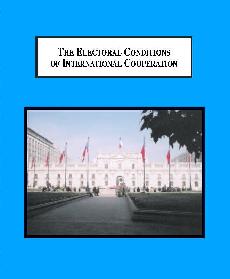Electoral Conditions of Economic Cooperation. How Democracies Select Their Leaders Affects Their Foreign Policy

| Author: | Rey, Denis | |
| Year: | 2010 | |
| Pages: | 164 | |
| ISBN: | 0-7734-3764-9 978-0-7734-3764-7 | |
| Price: | $159.95 + shipping | |
| (Click the PayPal button to buy) | ||
Examines whether electoral rules impact the level of multilateralism, or cooperative policies, that countries pursue. Specifically, this research looks at International Governmental Organization membership, foreign aid donations, and trade tariffs to determine whether some democracies, because of the degree of representativeness afforded by their political institutions, pursue such preferences to a greater extent than others.
Reviews
“Dr. Rey’s book contributes greatly to our understanding of a little explored question. It draws attention to previously neglected dimensions of foreign policy behavior. It provides more systematic evidence for differences among democracies than prior studies. The questions raised and the answers given are sure to provoke discussion and debate.” – Dr. John Barkdull, Colorado Springs, Colorado
“Denis Rey offers a work that provides a unique view of domestic electoral politics and their impact on international relations that demonstrates clearly that political philosophy still has relevance and can still inform contemporary empirical research in the discipline.” – Prof. Jeff William Justice, Tarleton State University
“[This work’s] nuanced measure of consensus democracy is forward thinking and offers us opportunities to nuance future research agendas. The rigor of the statistical analysis and clear discussion of the findings makes it a useful tool for methodological study as well.” – Prof. Samuel S. Stanton, Jr., Grove City College
“Denis Rey offers a work that provides a unique view of domestic electoral politics and their impact on international relations that demonstrates clearly that political philosophy still has relevance and can still inform contemporary empirical research in the discipline.” – Prof. Jeff William Justice, Tarleton State University
“[This work’s] nuanced measure of consensus democracy is forward thinking and offers us opportunities to nuance future research agendas. The rigor of the statistical analysis and clear discussion of the findings makes it a useful tool for methodological study as well.” – Prof. Samuel S. Stanton, Jr., Grove City College
Table of Contents
Foreword by John Barkdull
Acknowledgements
Introduction
1. What Others Have Found
2. Why Electoral Rules Foster International Cooperation
3. Measures, Models, and Methodology
4. Statistical Analyses of IGO Membership, Foreign Aid, and Trade Openness
5. Discussion and Conclusion
Appendix A: Statistical Analysis using OLS Regression
Appendix B: Statistical Analysis using GEE
Appendix C: Analyses of OLS Regression, PCSE, and GEE Results
Bibliography
Index
Acknowledgements
Introduction
1. What Others Have Found
2. Why Electoral Rules Foster International Cooperation
3. Measures, Models, and Methodology
4. Statistical Analyses of IGO Membership, Foreign Aid, and Trade Openness
5. Discussion and Conclusion
Appendix A: Statistical Analysis using OLS Regression
Appendix B: Statistical Analysis using GEE
Appendix C: Analyses of OLS Regression, PCSE, and GEE Results
Bibliography
Index
